Do you want to download the macOS Monterey DMG file to install it on another Mac computer or in a virtualization program? This article will show you how to download macOS Monterey DMG, create a macOS Monterey DMG file, and much more. Now, let's get started!
| Workable Solutions | Step-by-step Troubleshooting |
|---|---|
| Fix 1. DMG Download Links | You can download macOS Monterey DMG files by clicking the macOS Monterey DMG...Full steps |
| Fix 2. Create a Bootable DMG File | To install macOS Monterey on a virtualization program or a Mac, you can download it...Full steps |
| Fix 3. Create a New DMG File | You can follow one of the simplest ways to create a DMG file using the macOS Monterey app...Full steps |
Unlike Windows, which uses.exe files and other file extensions to install applications from the web, you can open DMG files on Mac. DMG, short for "Disk Image File," is a digital image of a program created from the physical disk.
Usually, DMG files contain the app installation files, but if you want to store compressed files, you can even do that. Apart from this, you can also protect the DMG files with a password.
Surprisingly, previous and the latest macOS versions can be downloaded and installed on your latest M1 and previous Intel Macs or in a virtualization program using the macOS' DMG file. By downloading the macOS DMG file and installing it in a virtualization program, you can test that version of the macOS out.
If you're curious as to what virtualization software supports macOS, there are a lot of virtualization programs that support macOS. But VMware and VirtualBox are quite popular virtualization programs that are reliable and trusted by many.
Why: macOS Monterey DMG Files Are Used for
The installation file will be downloaded using the DMG file if you're downloading a program from the web instead of the app store. The pros of DMG files are that they are smaller in size because they are compressed.
Since macOS Monterey is an entire OS and is larger in size, it'll take longer to download from the web, which is inconvenient for most users. Instead, users can download the macOS Monterey DMG file, which will be just a few GB in size.
As a result, if you want to test or install macOS Monterey on a virtualization program, download the macOS Monterey DMG file first, then install the program by accessing the DMG file.
Fixes: How to Download macOS Monterey DMG Files
Before we proceed, we'd advise you to create a backup of your Mac computer. If you accidentally do something wrong or miss a step, you can later recover your data using your backup.
Once you've created a backup of your computer, here's a step-by-step guide to downloading the macOS Monterey DMG file.
Fix 1. macOS Monterey DMG Download Links
Thanks to Techrechard, you can download macOS Monterey DMG files by clicking the macOS Monterey DMG download link. Once you've downloaded the DMG file for macOS Monterey, you can move it to a USB drive and then plug it into another Mac to install or install it in a virtualization program.
Fix 2. Create a Bootable DMG File
To install macOS Monterey on a virtualization program or a Mac, you can download it from the App Store and create and open a DMG file.
Once you create a DMG file of macOS Monterey, you can move it to a USB drive and install it on a secondary Mac computer or a VM program.
Here's what you need to do:
Step 1. Open the App Store and search for macOS Monterey.
Step 2. Click "Get" and wait for a few minutes for the downloading to be completed.
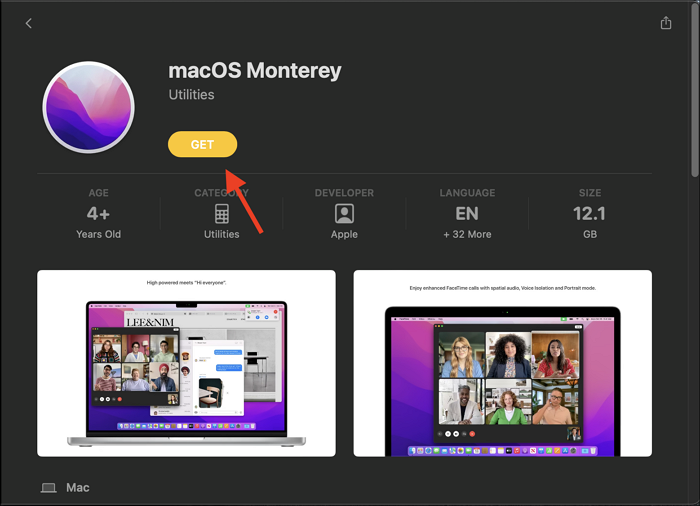
Step 3. After downloading, open "Finder" and then look for "Install macOS Monterey."
Alternatively, if macOS Monterey is unavailable in the App Store, you can download it using Mac Deploy Disk. It is a system administration tool built for Macs. Using Mac Deploy Disk, you can download macOS Monterey in a few seconds or even select between different macOS Monterey versions and download them.
Once you've downloaded macOS Monterey, it's time to create a bootable DMG file. Follow the instructions closely to create a bootable macOS Monterey DMG file.
Step 1. Open "Spotlight," search for "Terminal," and open it from the results.
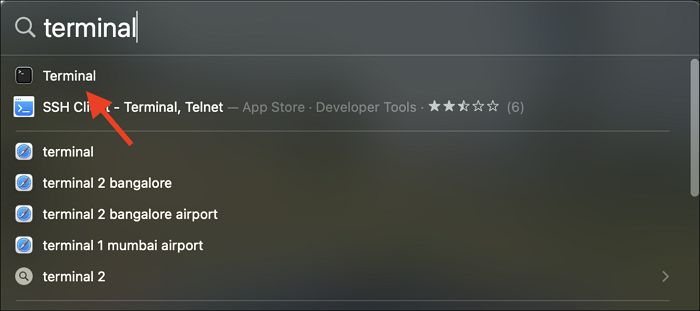
Step 2. Create a blank DMG file by entering this command hdiutil create -o Monterey -size 15000m -volname Monterey -layout SPUD -fs HFS+J.
Step 3. You should mount your monterey.dmg file to an available volume. Enter the command hdiutil attach Monterey.dmg -noverify -mountpoint /Volumes/BigSur
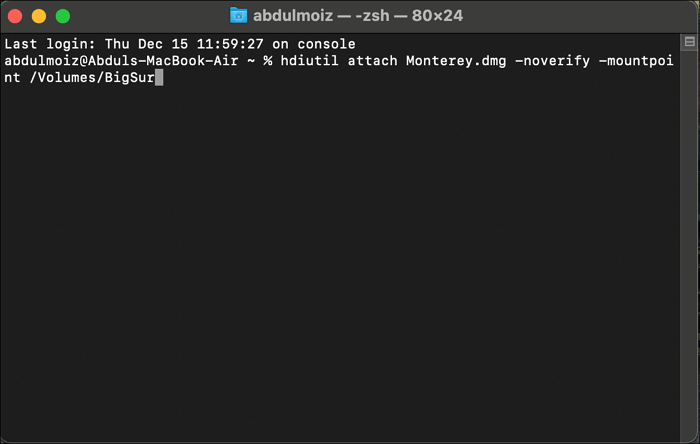
Step 4. Finally, enter this command to complete the process "sudo /Applications/Install\ macOS\Monterey.app/Contents/Resources/createinstallmedia --volume /Volumes/Monterey –nointeraction"
Step 5. Wait a few minutes for the process to be completed, and enter your password whenever requested.
Step 6. Once the process is complete, go to the desktop, and you should see the disk for "Monterey." Right-click on it and select "Eject."
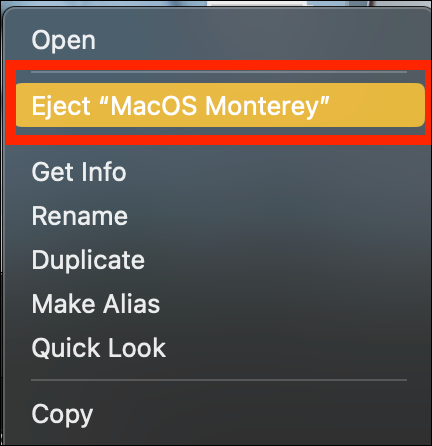
Fix 3. Create a New DMG File from macOS Monterey App
Alternatively, you can follow one of the simplest ways to create a DMG file using the macOS Monterey app. The steps are quite similar to the solution mentioned above, but instead of using the Terminal, we'll use Disk Utility this time.
Here's what you need to do:
Step 1. Open the App Store and search for macOS Monterey.
Step 2. Once the search results have populated and you find macOS Monterey in the search results, click on "Get" to begin downloading.
Step 3. Now open "Spotlight" and search for "Disk Utility."
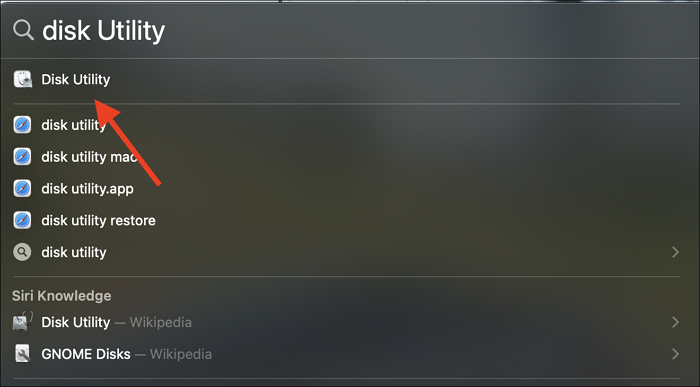
Step 4. In the menu bar, click on the file, select " New Image," and select "Blank Image."

Step 5. Give the DMG file a name, and then select the size of the DMG file's capacity. It's easy; simply type 16 GB and click "Save."
Step 6. Wait for a few seconds, and a blank DMG file should be created, and you should also see a disk icon on the desktop.
Step 7. Open "Finder" and go to the "Applications" folder, then locate "Install macOS Monterey" and copy it by pressing "CMD + C."
Step 8. In the left-side menu of "Finder," under the "Locations" tab, click on the DMG disk you just created. Now click on the right-side window and press "Ctrl+V" to paste the file.
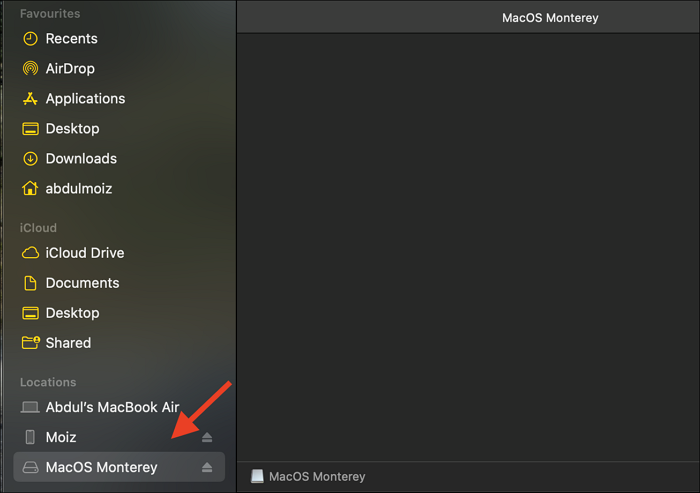
Step 9. Finally, click on the "Eject" icon after the file has been pasted.
Step 10. Now, go to "Documents" and copy/move the DMG file to a USB drive or the cloud.
Bonus Tip: Recover Deleted DMG Files on Mac
If you created a DMG file for macOS Monterey or for any other macOS version, but it was accidentally deleted, you can use EaseUS Data Recovery Wizard for Mac to restore it in a matter of seconds.
Not only can you restore the DMG file, but you can also recover any files that have been deleted accidentally or due to an error such as a system crash, computer malfunction, or any other type of system error.
EaseUS Data Recovery Wizard for Mac
- It is your best option if you don't know how to use the command line in Terminal and don't have a Time machine backup.
- You can restore data from a formatted Mac hard drive or unplan when a system crash or virus attack loses your files.
- EaseUS Data Recovery Wizard for Mac also can help recover DMG files deleted by the command line in the Terminal.
EaseUS Data Recovery Wizard for Mac has a very easy user interface that is simple to use by people of any age. Her are the steps for recovering files on Mac:
Step 1. Select the drive to be scanned
In the main EaseUS Data Recovery Wizard window, there will be a list of the drives connected to your Mac. Select the drive you need to recover lost/deleted files from, and click the "Search for lost files" button.
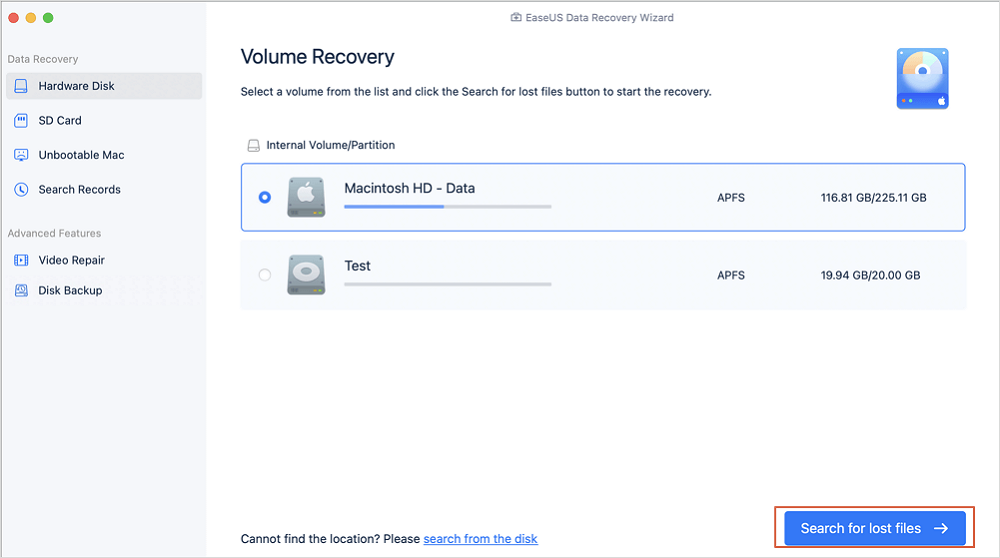
Step 2. Select your lost data/files
EaseUS Data Recovery Wizard for Mac will immediately scan your selected disk volume and display the scanning results on the left pane. You can sort the results to find the wanted files if you are looking for certain files.
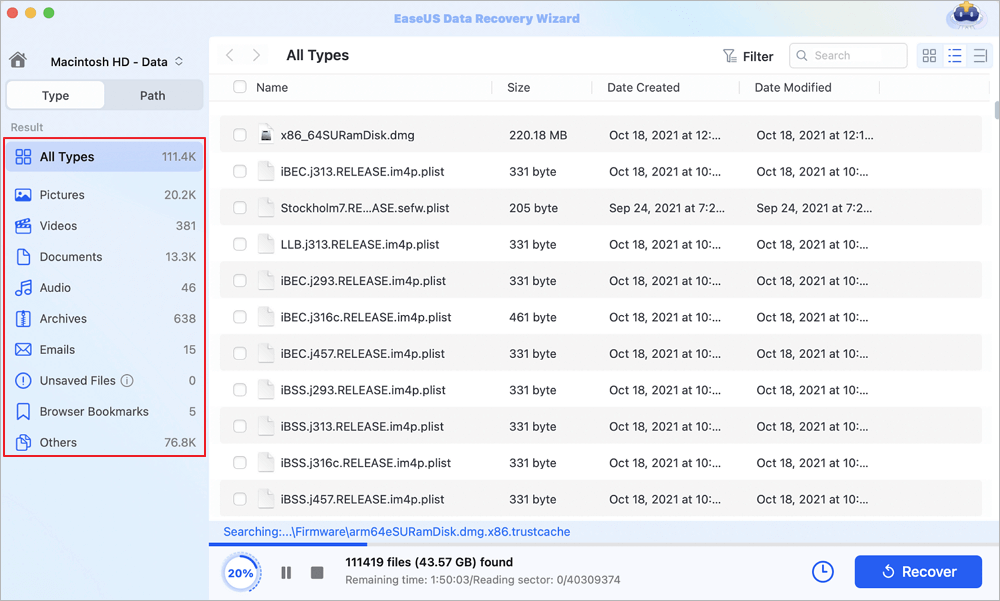
Step 3. Recover lost/deleted data
Once you have found the desired files, preview the files and then click "Recover" to begin the recovery of your deleted/lost Mac files.
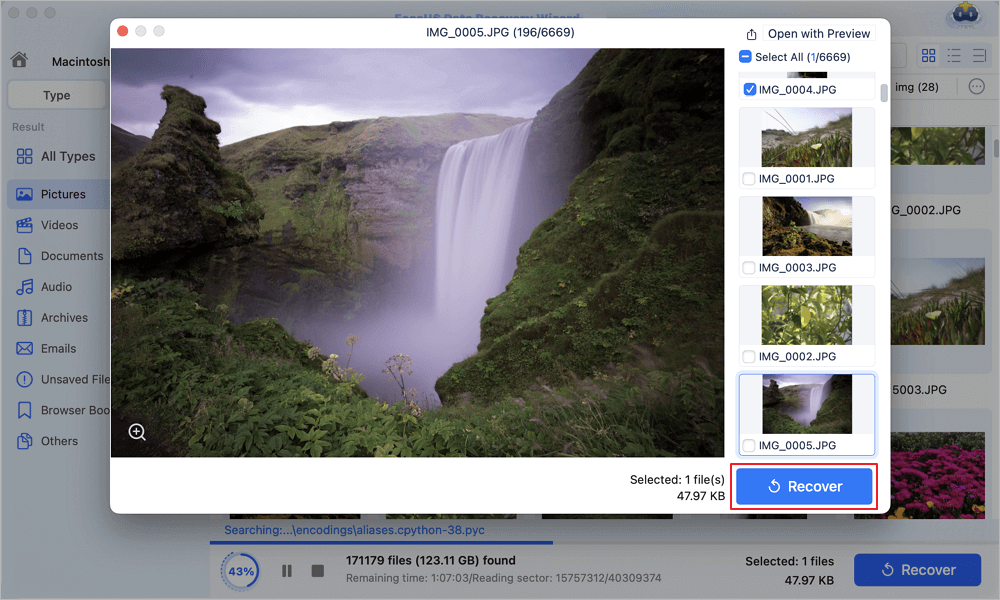
Final Thoughts
We believe we have provided the best explanation of a DMG file and how to download the macOS Monterey DMG file for use with virtualization software or to install on a Mac computer. If we've done a good job, please let us know by commenting on this post or sharing this article with your friends, family, or social media!
macOS Monterey DMG file Download FAQs
Here are the answers to some frequently asked questions about downloading the macOS Monterey DMG.
1. Can I delete DMG files after software installation?
You certainly can. DMG files can be erased after installing software because they eventually become obsolete. As a result, decreasing it may free up computer storage.
Tip: If you accidentally deleted DMG files, use the procedure described above to recover them.
2. Where can I download the macOS Monterey DMG?
You can download macOS Monterey's DMG file by visiting this website: macOS Monterey DMG by Techrechard.com.
3. How can I open a DMG file?
Double-clicking DMG files in their respective locations, such as the Download folder, the desktop, and so on, will open them directly. A box with the text "opening-name.dmg" will then appear. You can access the DMG file on Mac immediately after the verification process is complete and it has been automatically unlocked.
4. What can DMG files on the Mac do?
- DMG files have improved compression and encryption, and their key value is that they can be considered detachable disks.
- DMG files can read and write data and can be expanded as needed.
- Extra DMG files might severely diminish your PC's storage space.
Was This Page Helpful?
Jaden is one of the editors of EaseUS, who focuses on topics concerning PCs and Mac data recovery. Jaden is committed to enhancing professional IT knowledge and writing abilities. She is always keen on new and intelligent products.
Related Articles
-
Fix 0x80070780: The File Cannot Be Accessed by the System Error in Windows 10/8/7 [10 Fixes]
![author icon]() Tracy King/2025-07-04
Tracy King/2025-07-04 -
SD Card Keeps Disconnecting or Disappearing
![author icon]() Tracy King/2025-07-04
Tracy King/2025-07-04 -
How to Factory Reset an Acer Laptop on Windows 10/8/7
![author icon]() Brithny/2025-07-04
Brithny/2025-07-04 -
7 Solutions to Fix Mac Camera Not Working in 2025
![author icon]() Brithny/2025-07-22
Brithny/2025-07-22
EaseUS Data Recovery Services
EaseUS data recovery experts have uneaqualed expertise to repair disks/systems and salvage data from all devices like RAID, HDD, SSD, USB, etc.